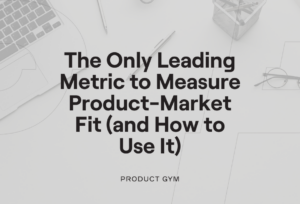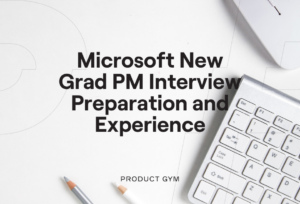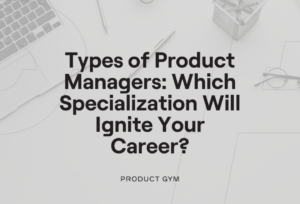This blog post was originally published on Medium.
When I started interviewing for my role as a product manager after being a PM for nearly 2 years, I was shocked at the number of interviews I was feeling extremely incompetent and then rightfully getting rejected at most of them. What I began to observe was the huge gap between what I experienced actually working as a PM Versus the “industry expectations” from a PM especially in my experience interviewing for Product Manager in the era of the “tech hiring freeze.”
Part 1 — When I Began Interviewing for Sr. PM Roles
titles in PM world are not very standard and should not be the criterion for choosing a job or motivation to join a company but they are important to be considered when interviewing both from experience of employee as well as clarity in employer’s expectation of the role
I have primarily worked at startups in the last 6 years and I absolutely enjoy the resourcefulness and scrappiness that the job of a PM requires of me and a lot of people in my network (ex-colleagues, MBA Batch mates, and friends working in similar domains). Here is the list of things that became clearer to me as I sat and got rejected for a lot of interviews —
- that most of us did not get any “formal training” to manage a product and did whatever was needed to ship the product feature that solves a problem statement for the target user segment sometimes it may require strategic thinking and sometimes it may be heavy on operational excellence or sometimes being a very tactful mediator across multiple teams who have not historically collaborated most efficiently in the past,
- that means we did not go to work and talk in “frameworks” because we may not have resources allocated to the project until the very end or a significant customer’s expansion/renewal contract led to changing the roadmap for 3rd time within 6 months or there was a change in Business Priorities because of the changing competitive landscape or macro-economic conditions.
- that means we did not have quantitative data for a lot of decision-making because while you may have a great analytical tool set up along with an overworked product analyst in the team, the instrumentation may be missing to understand the usage of the feature to base significant decisions on creation or replacement of a feature altogether!
- that also means sometimes you are the only person doing user research via surveys/ interviews, MVP Design prototyping in Figma, and gathering competitive intelligence all before even getting the idea approved or getting a team of engineers or design team assigned to you (in some cases you have all the stars aligned and all the resources allocated to project already and that is not the norm ☺️).
During Interviews I realized that the more authentic I was with what I had truly done versus what the interviewing committee wanted to know about my experience was not aligning well and I began to doubt the entire experience I had gathered over the many years working in multiple roles and finally ending up and loving the role of product manager (P.S. Majority of people find their way into product management instead of starting as one straight out of college)
Part 2 — Took a Step Back and Identified the Problem Statement
What made a further spiral of self-doubt more brutal was the fact that I am about to graduate with an MBA from one of the most prestigious universities in the world and here I was struggling to communicate my experience and skills in an effective manner while people around me were raising fundings of couple million dollars, getting into YC Combinator or simply pivoting to entirely different career lanes.
But, a blessing-in-disguise a semi-expected layoff very quickly moved me to change my strategy from extreme self-doubt to get an objective understanding of what is it that needed to be done.
The problem was not with my skill set, the relevance of my working experience or my English (which happens to be my 2nd language), my gender, or my basic level of smartness and intelligence,
the answer was — I needed to learn How to better prepare for interviews and understand how product managers across different companies work and think. Here is what helped me to identify my next steps –
- what I did was got out of my own head and reached out to mentors I have had the privilege of choosing and maintaining relationships with over the years.
- what I did next made a list of areas that I found myself struggling with answering and categorizing them as “more Interview prep needed” Versus “more conceptual understanding needed” Versus “Simply cannot learn without actually experiencing it”

- and what I did after recognizing that a lot of people who I look up to as “veterans” have gone through something exactly the same or similar, lot of my peers were either struggling themselves or feeling burnt out. Data always helps me calm my nerves and after loosely putting all the questions I was asked of in interviews (good and bad) and tagging the sentiment for each, i acknowledged I was not as dumb or incompetent as I had made it in my mind! And I need more help with interview prep and in today’s day and age not spending an insignificant amount of money to help you with something significant is so out of brand!
Part 3: Lights, Camera, and Action!

I checked out a bunch of courses and instructors that were offering learning on preparing for product management interviews. More than relying on the course structure, I made my decision based on the Linkedin Content that the instructors would share regularly and if they would be able to help me with the questions I would have instead of a standard course structure. I Landed on the LinkedIn profile of Diego Granados and took the Product Interview Operating System course that I was comfortably able to finish in 3.5 weeks with amazing support built-in slack community where the instructor as well as the success/struggle stories of other people was super motivating.
This is what changed during my interview process based on the learnings from the Product Interview Operating System course —
- Interview stakeholder management As expected from a good PM, I began curating my answers/presentation/experience/storytelling differently for different stakeholders. I mostly talked to Engineering, Design, Data, Sales Engineering, Product Managers, Product Head, and CEO/CTO.
>> Here’s what I did — I created two slide decks to describe two projects I had worked on for different stakeholders to improve my storytelling skills(First project’s 2 slide decks were meant for engineering and design while another project’s 2 slide decks were more focussed on presenting to Executives and Sales)
- Framework Questions — There are many frameworks in the market and a lot of them fail in real life for the lack of time available, resources available, historical context, etc.
>> Here’s what I did — I selected and picked two frameworks that best aligned with how I groom JIRA Backlog or prioritize features or create a roadmap for multiple years. Needless to say, STEP framework was 1 of the clear choices
- Navigating Questions I had no clue about — I never lied about what I had not worked on. I realized it was almost never frowned upon unless it was very essential and basic for a PM to know.
>>Here’s what I did- I recognized and took the time to build clarity on what are the strategic goals for me in the next 2–3 years. I was obviously of the kind of projects that I have experience with and wanted to continue working in Data/ Platform/ Infrastructure products. The clarity helped me feel less insecure about things I did not know and further acknowledge things I would want to learn versus learning everything.,
- Navigating Questions on “What is your favorite Product and how would you improve it?”
>>I picked up 10 existing popular products to write scrappy feature improvement docs. I would then leverage the structure and tips provided by Diego in the course to create an answer that was balanced as well as thoughtful (apps i chose were: google — google map, Airbnb – Experience, Amazon — Prime Video, Spotify — Podcasts, WhatsApp — stories, TikTok — creator analytics, Instagram — Reel engagement stats, Apple — Health, Snowflake — , Medium — Author Dashboard, Flo — Ovulation Tracker)
- Miscellaneous
>>I took a look at the release notes of 5 companies and tried to identify the theme amongst various features they would release and understand the business goals behind releasing feature X from marketing, positioning, pricing, customer demographic target, etc.(this is where the courses I took during MBA helped)
I am extremely glad I took the boot camp because this certainly helped me get some of the lost confidence back as well as understand that it would be an iterative and continuous process. I still do a lot of the above things now that I am not searching for a job. I start as a Sr. Product Manager at a Fintech startup next month and will continue to share my experiences in a new industry and moving from remote to hybrid mode!



